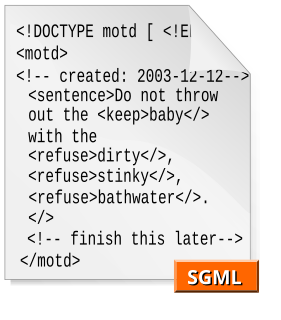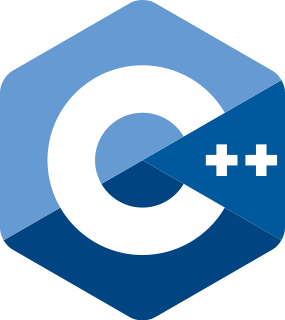ANSI C, ISO C, and Standard C are successive standards for the C programming language published by the American National Standards Institute (ANSI) and the International Organization for Standardization (ISO). Historically, the names referred specifically to the original and best-supported version of the standard. Software developers writing in C are encouraged to conform to the standards, as doing so helps portability between compilers.
In computer science, an integer is a datum of integral data type, a data type that represents some range of mathematical integers. Integral data types may be of different sizes and may or may not be allowed to contain negative values. Integers are commonly represented in a computer as a group of binary digits (bits). The size of the grouping varies so the set of integer sizes available varies between different types of computers. Computer hardware nearly always provides a way to represent a processor register or memory address as an integer.

The Standard Generalized Markup Language is a standard for defining generalized markup languages for documents. ISO 8879 Annex A.1 states that generalized markup is "based on two postulates":
SQL is a domain-specific language used in programming and designed for managing data held in a relational database management system (RDBMS), or for stream processing in a relational data stream management system (RDSMS). It is particularly useful in handling structured data, i.e. data incorporating relations among entities and variables. SQL offers two main advantages over older read–write APIs such as ISAM or VSAM. Firstly, it introduced the concept of accessing many records with one single command. Secondly, it eliminates the need to specify how to reach a record, e.g. with or without an index.

Extensible Markup Language (XML) is a markup language and file format for storing, transmitting, and reconstructing arbitrary data. It defines a set of rules for encoding documents in a format that is both human-readable and machine-readable. The World Wide Web Consortium's XML 1.0 Specification of 1998 and several other related specifications—all of them free open standards—define XML.

C++ is a general-purpose programming language created by Bjarne Stroustrup as an extension of the C programming language, or "C with Classes". The language has expanded significantly over time, and modern C++ now has object-oriented, generic, and functional features in addition to facilities for low-level memory manipulation. It is almost always implemented as a compiled language, and many vendors provide C++ compilers, including the Free Software Foundation, LLVM, Microsoft, Intel, Oracle, and IBM, so it is available on many platforms.
Document Schema Definition Languages (DSDL) is a framework within which multiple validation tasks of different types can be applied to an XML document in order to achieve more complete validation results than just the application of a single technology.
ISO 31 is a superseded international standard concerning physical quantities, units of measurement, their interrrelationships and their presentation. It was revised and replaced by ISO/IEC 80000.
A language-independent specification (LIS) is a programming language specification providing a common interface usable for defining semantics applicable toward arbitrary language bindings.
ISO/IEC 10967, Language independent arithmetic (LIA), is a series of standards on computer arithmetic. It is compatible with ISO/IEC/IEEE 60559:2011, more known as IEEE 754-2008, and much of the specifications are for IEEE 754 special values (though such values are not required by LIA itself, unless the parameter iec559 is true). It was developed by the working group ISO/IEC JTC1/SC22/WG11, which was disbanded in 2011.
Programming languages are used for controlling the behavior of a machine. Like natural languages, programming languages follow the rules for syntax and semantics.
A class in C++ is a user-defined type or data structure declared with keyword class that has data and functions as its members whose access is governed by the three access specifiers private, protected or public. By default access to members of a C++ class is private. The private members are not accessible outside the class; they can be accessed only through methods of the class. The public members form an interface to the class and are accessible outside the class.

EXPRESS is a standard data modeling language for product data. EXPRESS is formalized in the ISO Standard for the Exchange of Product model STEP, and standardized as ISO 10303-11.
Knowledge Discovery Metamodel (KDM) is a publicly available specification from the Object Management Group (OMG). KDM is a common intermediate representation for existing software systems and their operating environments, that defines common metadata required for deep semantic integration of Application Lifecycle Management tools. KDM was designed as the OMG's foundation for software modernization, IT portfolio management and software assurance. KDM uses OMG's Meta-Object Facility to define an XMI interchange format between tools that work with existing software as well as an abstract interface (API) for the next-generation assurance and modernization tools. KDM standardizes existing approaches to knowledge discovery in software engineering artifacts, also known as software mining.
ISO/IEC 27002 is an information security standard published by the International Organization for Standardization (ISO) and by the International Electrotechnical Commission (IEC), titled Information technology – Security techniques – Code of practice for information security controls.
ISO/IEC JTC 1/SC 22 Programming languages, their environments and system software interfaces is a standardization subcommittee of the Joint Technical Committee ISO/IEC JTC 1 of the International Organization for Standardization (ISO) and the International Electrotechnical Commission (IEC) that develops and facilitates standards within the fields of programming languages, their environments and system software interfaces. ISO/IEC JTC 1/SC 22 is also sometimes referred to as the "portability subcommittee". The international secretariat of ISO/IEC JTC 1/SC 22 is the American National Standards Institute (ANSI), located in the United States.
The ISO basic Latin alphabet is a Latin-script alphabet and consists of two sets of 26 letters, codified in various national and international standards and used widely in international communication. They are the same letters that comprise the English alphabet.
Embedded C is a set of language extensions for the C programming language by the C Standards Committee to address commonality issues that exist between C extensions for different embedded systems.
Language-independent may refer to:
ISO/IEC 27001 is an international standard on how to manage information security. The standard was originally published jointly by the International Organization for Standardization (ISO) and the International Electrotechnical Commission (IEC) in 2005 and then revised in 2013. It details requirements for establishing, implementing, maintaining and continually improving an information security management system (ISMS) – the aim of which is to help organizations make the information assets they hold more secure. A European update of the standard was published in 2017. Organizations that meet the standard's requirements can choose to be certified by an accredited certification body following successful completion of an audit. The effectiveness of the ISO/IEC 27001 certification process and the overall standard has been addressed in a recent large-scale study.



